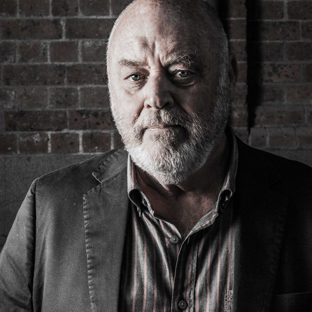The sea has loomed large throughout Robert Drewe’s body of work, from the award-winning memoir The Shark Net to the short-story collection, The Rip. His new novel, Whipbird, takes us inland to Ballarat. But the sense of unseen currents tugging beneath the calm surface is as present here as ever in Drewe’s work.
Six generations of the Cleary family have gathered at Hugh and Christine Cleary’s new vineyard, the eponymous Whipbird, to commemorate their Irish ancestor’s arrival in the region 160 years earlier. But as the weekend progresses, the clan – some members familiar, some complete strangers – will learn a lot about themselves, each other and the place they all come from. It’s an exhilarating story told with humour and sharp observation.
For decades, Robert Drewe has been drawing readers into his own complex preoccupations with Australian legend and landscape. Join one of Australia’s best loved, and most celebrated authors, in conversation with Hannie Rayson at Ballarat’s Museum of Australian Democracy at Eureka.
Presented in partnership with M.A.D.E. Museum of Australian Democracy at Eureka, Ballarat.
Featuring

Robert Drewe
Robert Drewe is an Australian literary legend whose more than 20 highly acclaimed books, including novels, short stories and memoirs have won state, national and international prizes, been widely translated, and been adapted for film, television, theatre and radio.
Born in Richmond, Melbourne, he grew up in Western Australia around the Indian Ocean coast and the Swan River, settings which deeply influenced his life and work, especially his memoirs The Shark Net and Montebello. After a short career as an award-winning journalist, at the age of 28 he turned frm newspapers to fiction writing with his debut novel The Savage Crows.
His other novels include The Drowner, A Cry in the Jungle Bar, Grace, Our Sunshine and Fortune, which won the National Book Council’s prize for fiction. His short-story collections are The Bodysurfers, The Rip and The Bay of Contented Men which won a Commonwealth Writers’ Prize.
The Drowner, the first novel to win the Premier's Literary Prize in every State, also won the Australian Book of the Year Prize, the Adelaide Festival Prize for literature and was voted one of the ten best international novels of the decade.
The Shark Net won the Western Australian Premier's Prize for Non-Fiction, The Courier-Mail Book of the Year Prize and the Vision Australia Award. Like The Bodysurfers it was also adapted into an ABC and BBC TV mini-series, while Our Sunshine was made into the international film Ned Kelly, starring Heath Ledger.
The Bodysurfers, in print for the past 30 years, has been made an international Penguin Modern Classic. More recent books are The Beach: An Australian Passion, for the National Library of Australia, The Local Wildlife and Swimming to the Moon, both collections of his humorous sketches.
His latest novel, Whipbird, is partly inspired by the misadventures of one of his ancestors, a teenage Irish soldier in the British Army’s 40th Regiment of Foot, at the Eureka Stockade.
Hannie Rayson
Hannie Rayson is a playwright and screenwriter best known for Hotel Sorrento.
Hannie Rayson has established a reputation for topical, complex dramas written with wit and insight. A graduate of Melbourne University and the Victorian College of the Arts, she has an Honorary Doctorate of Letters from La Trobe University.
Her plays have been extensively performed around Australia and internationally. They include Mary, Room to Move, Hotel Sorrento, Falling From Grace, Scenes from a Separation (co-written with Andrew Bovell), Competitive Tenderness, Life After George, Inheritance, Two Brothers, The Glass Soldier and The Swimming Club. She has been awarded two Australian Writers’ Guild Awards, four Helpmann Awards, two NSW Premier’s Literary Awards and a Victorian Premier’s Literary Award as well as the Age Performing Arts Award and The Sidney Myer Performing Arts Award.
For television she has written Sloth (ABC, Seven Deadly Sins) and co-written two episodes of SeaChange. A feature film of Hotel Sorrento, produced in 1995, was nominated for ten Australian Film Institute Awards. In 1999 she received the Magazine Publishers' Society of Australia’s Columnist of the Year Award for her regular contributions to HQ magazine.
Hannie made playwriting history when Life After George was the first play to be nominated for the Miles Franklin Award. In 2006 and 2009 she was nominated for the Melbourne Prize for Literature, a prize for a Victoria-based writer whose body of published or produced work has made an outstanding contribution to Australian literature and to cultural and intellectual life.
She has recently completed a commission for the Manhattan Theatre Club in New York. Her new play is called Extinction.
